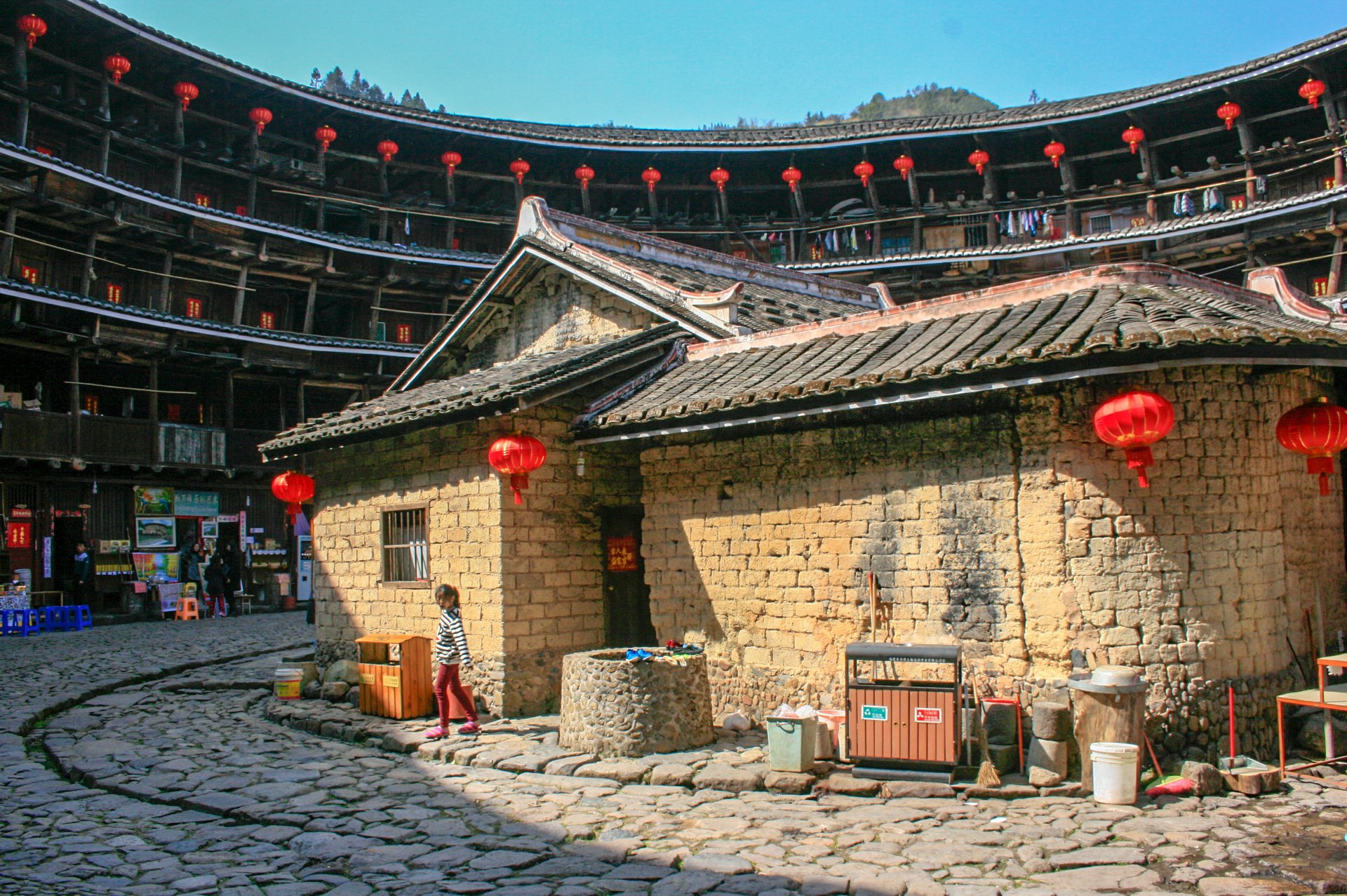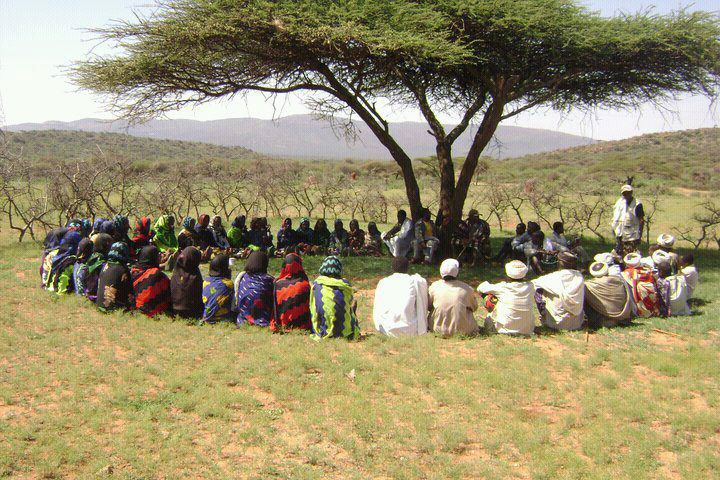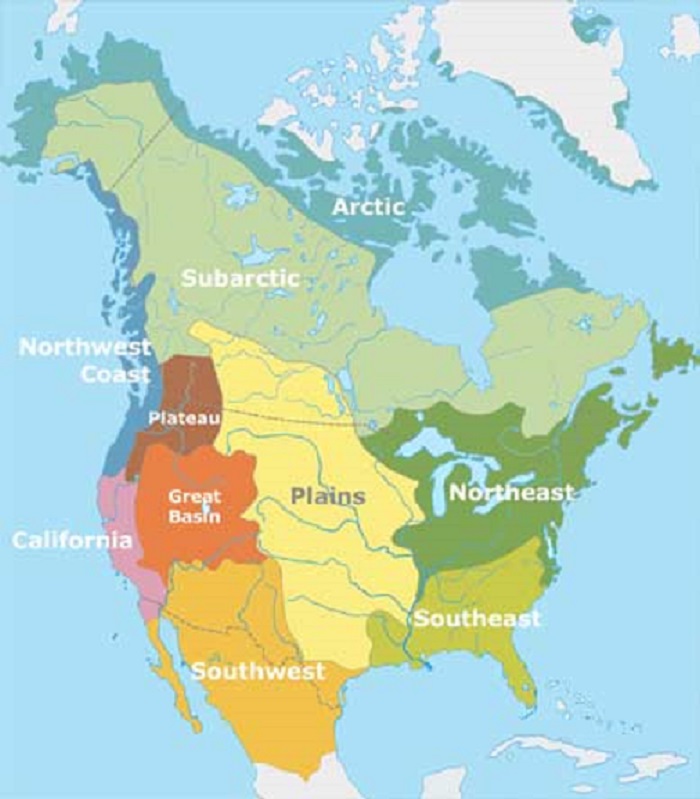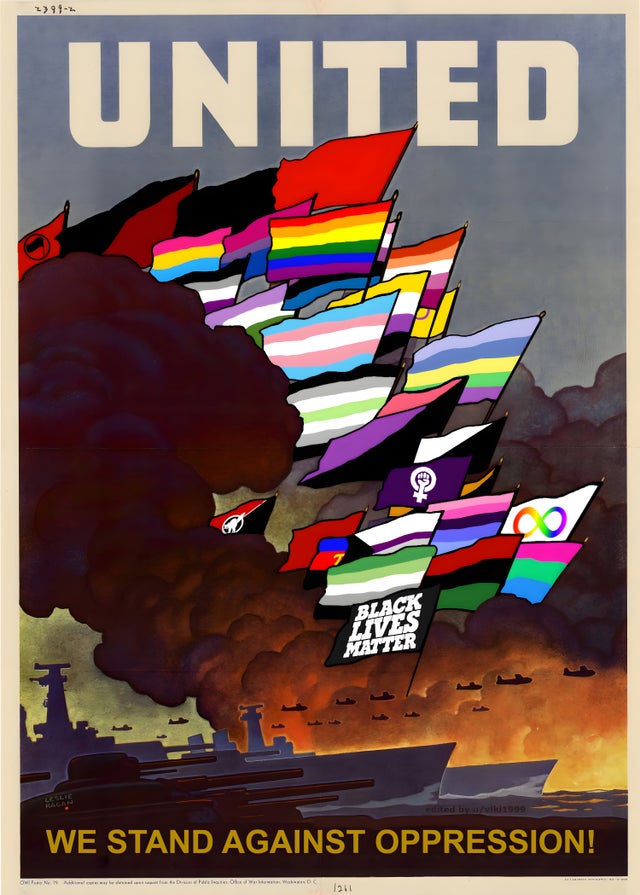The world I have been describing – 1, 2, 3, 4 – is run by democratic councils.
Small councils make local decisions. A bunch of those glom together into something more powerful but less intimate. A bunch of THOSE glom together and make something more powerful. And so on up to an anarchist version of the United Nations Security Council.
The Anarchist FAQ says – https://www.anarchistfaq.org/afaq/sectionH.html – “Firstly, anarchists have very clear ideas on what to “replace” the state with (namely a federation of communes based on working class associations).”
So I had to worldbuild a system of confederated democratic groups.
Version 1, the stupid way
The naïve obvious way to do this is:
- 1000 people form a local council. Ten of those local councils together form a council of 10,000 people. Ten of those for 100,000 people etc.
This sounds fine at first, but here’s the problem:
The group sizes are too specific: one thousand, ten-thousand, one-hundred-thousand… Somewhere in the world there is bound to be a group of 50,000 people, and then what??
That would be good in a different context, like a Barracks Communism world of commieblocks. You would get assigned to a population group of 100,000 people by a computer counting heads. It would be very grey and neutral and mathematically precise.
But the world I’ve been posting isn’t grey it’s colourful. It is very strongly tied to local or regional or tribal groupings or ethnolinguistic groupings or bioregions.
Supposing it’s an island with a unique culture. Or a Papuan language-group. That has some random population, 71,532 or whatever, and it should have its own council. Its uniqueness should be respected. It should be given its political voice.
Around the world, groups of any arbitrary size will exist. Populations will fluctuate with disasters, pandemics, and baby booms. This naïve system is altogether too rigid.
Version 2
Then I thought fine, instead of 1000, let us say the following units are possible –
-
1,000 to 9,999
-
Several of those glom together to form more powerful units of 10,000 to 99,999
-
etc.
That seemed to solve the problem.
But that raises a new problem: imagine you have 8000 people in your town. Your town is part of a province of 90,000 people.
You could tell the province you are one unit of 8000. But you would have an incentive to tell it you are 8 units of 1000, because then you’d have 8 times the voting power. We need to adjust voting power on a per capita basis. So that’s what I did –
Final version
Anarchist governance in my solarpunk world work like this –
Level One, the extended family. A Māori whānau
This is a group of no more than 180 people (the upper bound of Dunbar’s number). This has no formal governance or council (your granddad does not issue formal decrees lol). However, it is legally recognised (like in Terra there is some legal recognition of kinship ties).
Level Two, max 4000 people. A Māori hapū. A Greek τριττύες or maybe δῆμος. A Mapuche lof.
Imagine a village of 500 people with 5 families. Or maybe a big apartment building in a city (covered in solar panels and vegetables of course ;)
This unit formally recognises the existence of the extended families that constitute it. When it is picking a council, here’s how it picks it:
-
It takes the headcount of each extended family (including children), divides by 50, rounds to the whole nearest number. That’s the number of representatives of the family on the council. A family of 126-174 gets three reps, for example.
-
There will be random people who are not part of a large extended family. Maybe their family died. Maybe they are a recent immigrant. All such people in the territory are considered one group: the kinless. The number of kinless is divided by 50 and that’s their number of council reps. So if the apartment building has 30 people without strong extended families, they get 1 council seat. If they have fewer than 24 people, then the closest whole number is 0 and they get no reps. Does that suck for them? Yes. It sucks to be without a mutual aid group. You can petition an extended family to adopt you, and they might say “yes, in exchange for one year of intensive labour”.
-
As there are max 4000 people and one council seat per 50 people, that implies there will be max 80 seats on the council. This is a nice number for deliberation, everyone gets speaking-time, not too noisome.
Here is a Fujian Tulou that might house 600 people, so would have a council of 12 –

How do you get nominated for the council?
- You must volunteer, be seconded, and thirded. Anyone with this becomes a candidate. Candidates’ names are put into a random draw. (This excludes totally incompetent people. An objection to anarchism is “we need smart people ruling, not random people!” This system is some check that you must be a passably functional grown-up before you can be on the council.)
A two-thirds majority can pass a decision.
Examples of the powers of the 4000-person-or-less unit: Recognise the membership (“citizenship” if you like) of a foreigner, immigrant. Recognise marriages (people marrying into the group, becoming members). Settle internal disputes and torts. Allocate resource to maintain the courtyard, village green, etc. (though this would often be done without a formal process). Recognise a newly-formed extended family, split an extended family into two bureaucratically, dissolve an old/dead one.

Level Three, max 25,000 people. A Greek πόλεις.
This assembly officially/bureaucratically recognises a list of Level Two bodies within its territory. For each recognised Level Two Unit, it divides the population by 250 and that is the number of council-seats.
Same process of getting nominated as above. You don’t need to be a member of the Level Two Council.
Then from the candidates, representatives are picked at random.
A two-thirds majority of the council can pass a decision.
Note that we’ve stopped recognising non-members of lower level groups. Level Two recognised loose marbles who weren’t members of Level One, but that’s not the case up here.
Level Four, 25,001 to 160,000 people. A Māori iwi. A Mapuche aillarehue.
Same idea: it formally recognises Level Three units. It divides the population of each of those by 1350 and assigns them seats based on population. A worked example:
A small city with population 110,000 as six quarters:
- Northeast quarter – 12,000 people – 9 reps
- Northwest quarter – 14,000 people – 10 reps
- Southeast quarter – 13,000 people – 10 reps
- Southwest quarter – 11,000 people – 8 reps
- East quarter – 17,000 people – 13 reps
- West quarter – 23,000 people – 17 reps
(This worked example shows how I overcame the problem I had in Version 2 of the system. If doesn’t matter if your unit is big or small because political power is kept proportional to head-count.)
A possible objection: “it’s not fair that the 14,000 and the 13,000 member quarter have the same voice! This injustice will lead to backlash!” I think looking at Terra it’s not a huge deal: some people have slightly more/slightly less voting power based on where they live but it’s not something wars are fought over: it’s not like the malicious gerrymandering of Palestinian citizens of Israel. The system does create rounding errors, but it doesn’t create large imbalances.
A two-thirds majority can pass a decision.
Examples of the powers of the Level Four unit: A group this size should have its own small hospital. That will need to be assigned resources. Library too. If it is by a bay, it will have an open ocean farm. It may manage a commons: maybe a lake, maybe a forest. It will control the hunting season or fishing limits of the commons. It will cut deals with various guilds (see https://hexbear.net/post/596720) to supply it with WiFi, with bicycles, etc. in exchange for nice houses and good food.
Level Five, 160,001 to 900,000 people
Same deal. Each Level Four group gets one council seat per 7,750 population. That implies the council can have a max of about (900k / 7750=) 116 council members, a number that can fit in a room and have a debate.
To become a nominee, you must collect six signatures, not two.
I chose the limit of 900,000 for a reason. This paper – https://phys.org/news/2024-09-large-electorates-tend-evenly-results.html – found that groups under this size tend to reach consensus. For example Iceland has a population of 400,000, and the hive mind of Iceland will suddenly decide it’s time to legalise gay marriage. Whereas the population of the USA, being bigger, will split and squabble.
A two-thirds majority can pass a decision.
Examples of the powers of the Level Five unit: This might be a small city or a good-sized rural region. It will need a more complex, specialised hospital with an emergency ward, so it will have to assign resources to that. It might maintain a shipyard. A city of 750,000 people will have to run urban transport networks, shared bicycle schemes. Will also arrange contracts with guilds: actually assemblies at basically all levels except the smallest will make deals with guilds. It might arrange a barter-contract with another tribal unit: for example if this tribe lives on the coast, and 50 miles inland there is another tribe; we have too much fish, you lot have too much milk, let’s arrange a barter contract for one year. How many kg of fish per litre of milk? That will have to be negotiated.
Level Six, 900,001 to 8,500,000 people
Some nations are at this level, e.g. the Scots, the Serbs, the Danes, the Finns, the Dinka, Bosnians, Armenians, Moldovans. Tokyo contains three Level Six Units within it.
Each Level Five group gets one council seat per 60,000 population.
To be nominated for the council-lottery, you must collect 30 signatures.
A two-thirds majority can pass a decision.
Examples of the decisions before a Level Six unit: Maintains certain websites like wikis and maps. Organise sporting contests: who’s the best high-jumper in Serbia? A unit this big will need a train system and that will have to be managed and allocated resources. It will have to cut a deal with the microchip-fabrication guild to get a chip fab in their territory, make sure the citizens have electronics, and in return give the guildmasters perks like nice houses. Own and maintains a big stadium. Say our land has a copper mine: we give the electricians guild copper and they give us electrical services, and the council is what negotiates the contract. Owns and maintains a top-level hospital with every kind of medical specialist. Declare war.
Level Seven, 8,500,001 to 80,000,000 people
Now we are talking about the world’s major ethnolinguistic groups. Korea, Italy, France, Afghanistan, Australia, Taiwan, ‘the Norsemen’ as a whole, ‘the Celts’ as a whole, the Fula, Yoruba, Igbo, Amhara, Akan, Zulu. There are about 150-200 such in the world.
Each such federation sends a team to the World Cup and the Olympics. The major cultural zones of North America, e.g. the Plains Indians, although they consist of sub-tribes, form a confederacy at this level –

You know the drill by now. You get nominated by collecting 50 signatures. For each Level Six assembly, the head-count is divided by 750,000. Example, the Lyon metropolitan area has 2,300,000, so 3 lyonnais candidates are picked from a hat and go to the pan-French assembly. The population of France is 68,250,000 so the council of France has 91 people.
Level Eight, the world’s great races, basically continents
Only seven such exist so I’ll list them all
- Black Africa
- North Africa, the Arab world, all the Semites and West Asia with all the Turks and Huns and people of the Steppes
- the Americas as a whole
- the white race
- South Asia
- East Asia
- Austronesia
Each of the 7 races send 11 reps making 77. We have now abandoned head-counting: even a very populous Asia should not be able to dictate to Africa.
Each of the 7 councils has veto power. We have abandoned two-third majority.
There is no upper population limits here because they exist inherently: Africa will always be Africa no matter what the population.
Examples of the decisions before the World Council:
-
Should we allocate resources to eradicate mosquitoes? Let the council hear from various scientific experts about the pros, cons, likelihood of success, amount of required resources.
-
Should we embark upon building a global vactrain network?
-
Should we send a global peacekeeping force to stop Armenia and Azerbaijan from fighting?
So that’s how the councilors are picked, but who can PROPOSE a motion?
Popular vote: If a proposal goes out on the Internet, and 1% of the population of that unit sign it, the council must consider the proposal. e.g. the world has 8000 million people, so if 80 million people sign a petition saying ‘fuck mosquitoes kill em all’, the World Council must consider that. Or for a city of 1,000,000, the initiative would have to be signed by 10,000 people to get in front of the council.
The importance of briefing
Stanford University run a Deliberative Democracy Lab to explore councils of citizens debating and deciding things. Their system is lame, and I’m about to tell you why. Here they had Meta (i.e. facebook) get a deliberative assembly together to discuss tech policy and it says “A distinguished Advisory Committee vetted the briefing materials for the deliberations and provided many of the experts for the plenary sessions.”
Here’s the problem. You get random assemblies of neutral, fair citizens, put them in a room to deliberate. Good start. Then you spoonfeed them propaganda materials from facebook inc. upon which to base their decision, that is undue influence from facebook inc.
The councils will need to hear from experts on medical systems, ecology, trains, etc. They deliberate and make informed decisions. It’s not enough for the selection and voting of the council to be democratic, the system for picking briefing materials must be equally democratic.
Who can brief the council?
Same deal: popular vote:
- If 1% of the population (80 million for a World Assembly, thirty people for the assembly of a 3000-person neighbourhood) want a guy to have the right to give briefing materials, then the assembly must hear his briefing materials. This could be written or video. Here, btw, is where a powerful, influential person might gain some sway. The heavy use of sortilege blocks influential politicians from appearing in the system. But if you had an influential public intellectual like Noam Chomsky, everybody would vote for the council to have to listen to his brief. This would often include guilds: like if its a medical issue obviously people want to hear from the medical experts and they medical guild should have no problem getting votes.
One week term-limits lmao
A paper describing traditional West African governance says “In general there were no officeholders; only representatives of groups” and that is my ideal here. You don’t become a representative for a four-year term or a one-year term; you represent your people at ONE meeting. Then the lottery happens again for the next meeting. This prevents ego, keeps things nice and anarchist.
Groups can split/merge, be ad hoc
I said Level Six was anything between 900,001 to 8,500,000 people. The Nilotic peoples have a total population of 8 million, including the Dinka (2 million), Nuer (1.8 million), and Maasai (1.2 million).
So is this a single Level Six assembly or several?
And the happy answer is it doesn’t matter. The Dinka can call an assembly just for Dinka if they want, and make decisions affecting them only. Then the next month a pan-Nilotic assembly is called where that’s thought necessary. Because representation is kept proportional to population, splitting/merging groups doesn’t really affect power. This would have been a problem with the 2nd version of the system that I briefly considered.
Digitising this
From about 1994 onwards, it becomes possible to assign each citizen a PGP keypair. They can log on to a digital system to –
- Volunteer to be in the assembly-lottery
- Second a person who has volunteered.
- Vote that the City Council should consider Proposal 23B, which calls for more bicycles.
- Vote that David Graeber should be allowed address the World Council.
The system can track which person (i.e. keypair or digital identity) is a member of which groups. Liquid or delegative democracy could be implemented with a few lines of code. If people are represented by keypairs, counting heads to assign voting power becomes instant; you don’t have to do a paper census. I am adding a Census Guild to track all this, as it’s important to governance.
This is the most democratic, most anarchist thing I can think of. It’s inspired a bit by Council Communism, a bit by Bookchin/Öcalan’s democratic confederalism, a bit by traditional tribal systems, a bit by deliberative democracy, a bit by mathematics.
Please poke holes in it and tell me how a psychopath could capture power and subvert the system.


the extreme complexity and chance required to manipulate the process makes this sound quite resilient to me. i think the risk is low, but i wonder about the prevalence of gerrymandering at Level Two.
two questions:
i love these posts and i look forward to reading more!
I could actually simplify it a lot by scrapping most of the levels.
Rather than say “one rep per n population for communes between x and y”, I could simply say, “one representative per 0.01 n is picked”. So for a 3000 person commune, one per 30, for an 800,000,000 person continent, 1 per 8,000,000… That would have saved me a lot of word-count haha. That gives you 100 people, the right size for a deliberative assembly, not too big not too small.
That’s actually better come to think of it, but I wanted the reader to think about countries, cities, including familiar ones they know about like France.
Shit I see the opportunity you mean now. I might make adjustments. I should just remove the 180 limit, as I wasn’t very happy with that to begin with.
This post is just about political power, but there’s also economic power. If you don’t have a mutual aid group, who will help you grow your food? Who will help you build your house?
There are two mutual aid groups, as I’ve said: tribes and guilds. Tribes are rooted, consanguineous, and take care of food and housing. Guilds are more like professional societies, a brotherhood of everyone with the right training, and provide basically everything more technical/complex than food and housing.
So you could join a guild. Say you’re the Internet Service Providers Guild. You learn technical skills, make sure everyone has good WiFi and fiber. There is a contract saying: “The ISP Guild is responsible for there being good WiFi. The Tribe will give guild members food when they ask, build their houses, etc.” The guild is the non-consanguineous mutual aid group, based on technical skill instead.
It’s not like I invented the idea of clans and tribes. That is how human societies were organised until the market killed it.
‘Chosen family’ is a concept that only exists in late stage capitalism where the market has dissolved other mutual support groups. Can you imagine some Pashtun person saying “chosen family”? Or some Plains Indian in the pre-Columbian era? Or a caveman in a band for that matter? https://books.google.com/ngrams/graph?content=chosen+family&year_start=1950&year_end=2022&corpus=en&smoothing=3&case_insensitive=false
Thanks for saying this! I was (understandably) worried nobody outside my own skull would care hahaha